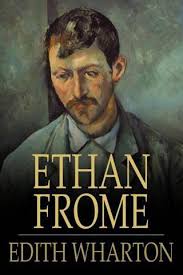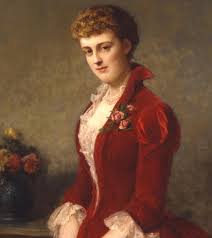Ethan Frome Page #3
Ethan Frome is a 1911 book by American author Edith Wharton. It is set in the fictitious town of Starkfield, Massachusetts. The novel was adapted into a film, Ethan Frome, in 1993.
He said no more, and I had to guess the rest from the inflection of his voice and his sharp relapse into silence. Another day, on getting into my train at the Flats, I missed a volume of popular science--I think it was on some recent discoveries in bio-chemistry--which I had carried with me to read on the way. I thought no more about it till I got into the sleigh again that evening, and saw the book in Frome's hand. “I found it after you were gone,” he said. I put the volume into my pocket and we dropped back into our usual silence; but as we began to crawl up the long hill from Corbury Flats to the Starkfield ridge I became aware in the dusk that he had turned his face to mine. “There are things in that book that I didn't know the first word about,” he said. I wondered less at his words than at the queer note of resentment in his voice. He was evidently surprised and slightly aggrieved at his own ignorance. “Does that sort of thing interest you?” I asked. “It used to.” “There are one or two rather new things in the book: there have been some big strides lately in that particular line of research.” I waited a moment for an answer that did not come; then I said: “If you'd like to look the book through I'd be glad to leave it with you.” He hesitated, and I had the impression that he felt himself about to yield to a stealing tide of inertia; then, “Thank you--I'll take it,” he answered shortly. I hoped that this incident might set up some more direct communication between us. Frome was so simple and straightforward that I was sure his curiosity about the book was based on a genuine interest in its subject. Such tastes and acquirements in a man of his condition made the contrast more poignant between his outer situation and his inner needs, and I hoped that the chance of giving expression to the latter might at least unseal his lips. But something in his past history, or in his present way of living, had apparently driven him too deeply into himself for any casual impulse to draw him back to his kind. At our next meeting he made no allusion to the book, and our intercourse seemed fated to remain as negative and one-sided as if there had been no break in his reserve. Frome had been driving me over to the Flats for about a week when one morning I looked out of my window into a thick snow-fall. The height of the white waves massed against the garden-fence and along the wall of the church showed that the storm must have been going on all night, and that the drifts were likely to be heavy in the open. I thought it probable that my train would be delayed; but I had to be at the power-house for an hour or two that afternoon, and I decided, if Frome turned up, to push through to the Flats and wait there till my train came in. I don't know why I put it in the conditional, however, for I never doubted that Frome would appear. He was not the kind of man to be turned from his business by any commotion of the elements; and at the appointed hour his sleigh glided up through the snow like a stage-apparition behind thickening veils of gauze. I was getting to know him too well to express either wonder or gratitude at his keeping his appointment; but I exclaimed in surprise as I saw him turn his horse in a direction opposite to that of the Corbury road. “The railroad's blocked by a freight-train that got stuck in a drift below the Flats,” he explained, as we jogged off into the stinging whiteness. “But look here--where are you taking me, then?” “Straight to the Junction, by the shortest way,” he answered, pointing up School House Hill with his whip. “To the Junction--in this storm? Why, it's a good ten miles!” “The bay'll do it if you give him time. You said you had some business there this afternoon. I'll see you get there.” He said it so quietly that I could only answer: “You're doing me the biggest kind of a favour.” “That's all right,” he rejoined. Abreast of the schoolhouse the road forked, and we dipped down a lane to the left, between hemlock boughs bent inward to their trunks by the weight of the snow. I had often walked that way on Sundays, and knew that the solitary roof showing through bare branches near the bottom of the hill was that of Frome's saw-mill. It looked exanimate enough, with its idle wheel looming above the black stream dashed with yellow-white spume, and its cluster of sheds sagging under their white load. Frome did not even turn his head as we drove by, and still in silence we began to mount the next slope. About a mile farther, on a road I had never travelled, we came to an orchard of starved apple-trees writhing over a hillside among outcroppings of slate that nuzzled up through the snow like animals pushing out their noses to breathe. Beyond the orchard lay a field or two, their boundaries lost under drifts; and above the fields, huddled against the white immensities of land and sky, one of those lonely New England farm-houses that make the landscape lonelier. “That's my place,” said Frome, with a sideway jerk of his lame elbow; and in the distress and oppression of the scene I did not know what to answer. The snow had ceased, and a flash of watery sunlight exposed the house on the slope above us in all its plaintive ugliness. The black wraith of a deciduous creeper flapped from the porch, and the thin wooden walls, under their worn coat of paint, seemed to shiver in the wind that had risen with the ceasing of the snow. “The house was bigger in my father's time: I had to take down the 'L,' a while back,” Frome continued, checking with a twitch of the left rein the bay's evident intention of turning in through the broken-down gate. I saw then that the unusually forlorn and stunted look of the house was partly due to the loss of what is known in New England as the “L”: that long deep-roofed adjunct usually built at right angles to the main house, and connecting it, by way of storerooms and tool-house, with the wood-shed and cow-barn. Whether because of its symbolic sense, the image it presents of a life linked with the soil, and enclosing in itself the chief sources of warmth and nourishment, or whether merely because of the consolatory thought that it enables the dwellers in that harsh climate to get to their morning's work without facing the weather, it is certain that the “L” rather than the house itself seems to be the centre, the actual hearth-stone of the New England farm. Perhaps this connection of ideas, which had often occurred to me in my rambles about Starkfield, caused me to hear a wistful note in Frome's words, and to see in the diminished dwelling the image of his own shrunken body. “We're kinder side-tracked here now,” he added, “but there was considerable passing before the railroad was carried through to the Flats.” He roused the lagging bay with another twitch; then, as if the mere sight of the house had let me too deeply into his confidence for any farther pretence of reserve, he went on slowly: “I've always set down the worst of mother's trouble to that. When she got the rheumatism so bad she couldn't move around she used to sit up there and watch the road by the hour; and one year, when they was six months mending the Bettsbridge pike after the floods, and Harmon Gow had to bring his stage round this way, she picked up so that she used to get down to the gate most days to see him. But after the trains begun running nobody ever come by here to speak of, and mother never could get it through her head what had happened, and it preyed on her right along till she died.”
Translation
Translate and read this book in other languages:
Select another language:
- - Select -
- 简体中文 (Chinese - Simplified)
- 繁體中文 (Chinese - Traditional)
- Español (Spanish)
- Esperanto (Esperanto)
- 日本語 (Japanese)
- Português (Portuguese)
- Deutsch (German)
- العربية (Arabic)
- Français (French)
- Русский (Russian)
- ಕನ್ನಡ (Kannada)
- 한국어 (Korean)
- עברית (Hebrew)
- Gaeilge (Irish)
- Українська (Ukrainian)
- اردو (Urdu)
- Magyar (Hungarian)
- मानक हिन्दी (Hindi)
- Indonesia (Indonesian)
- Italiano (Italian)
- தமிழ் (Tamil)
- Türkçe (Turkish)
- తెలుగు (Telugu)
- ภาษาไทย (Thai)
- Tiếng Việt (Vietnamese)
- Čeština (Czech)
- Polski (Polish)
- Bahasa Indonesia (Indonesian)
- Românește (Romanian)
- Nederlands (Dutch)
- Ελληνικά (Greek)
- Latinum (Latin)
- Svenska (Swedish)
- Dansk (Danish)
- Suomi (Finnish)
- فارسی (Persian)
- ייִדיש (Yiddish)
- հայերեն (Armenian)
- Norsk (Norwegian)
- English (English)
Citation
Use the citation below to add this book to your bibliography:
Style:MLAChicagoAPA
"Ethan Frome Books." Literature.com. STANDS4 LLC, 2025. Web. 23 Feb. 2025. <https://www.literature.com/book/ethan_frome_264>.








Discuss this Ethan Frome book with the community:
Report Comment
We're doing our best to make sure our content is useful, accurate and safe.
If by any chance you spot an inappropriate comment while navigating through our website please use this form to let us know, and we'll take care of it shortly.
Attachment
You need to be logged in to favorite.
Log In